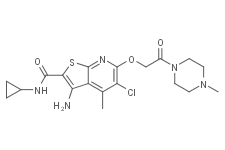
LY2119620
CAS No. 886047-22-9
LY2119620( LY2119620 | LY 2119620 | LY-2119620 )
Catalog No. M17642 CAS No. 886047-22-9
LY2119620 is a specific, and allosteric agonist of human M2 and M4 muscarinic acetylcholine receptors.
Purity : >98% (HPLC)
 COA
COA
 Datasheet
Datasheet
 HNMR
HNMR
 HPLC
HPLC
 MSDS
MSDS
 Handing Instructions
Handing Instructions
| Size | Price / USD | Stock | Quantity |
| 2MG | 66 | In Stock |


|
| 5MG | 113 | In Stock |


|
| 10MG | 178 | In Stock |


|
| 25MG | 344 | In Stock |


|
| 50MG | 512 | In Stock |


|
| 100MG | 737 | In Stock |


|
| 200MG | Get Quote | In Stock |


|
| 500MG | Get Quote | In Stock |


|
| 1G | Get Quote | In Stock |


|
Biological Information
-
Product NameLY2119620
-
NoteResearch use only, not for human use.
-
Brief DescriptionLY2119620 is a specific, and allosteric agonist of human M2 and M4 muscarinic acetylcholine receptors.
-
DescriptionLY2119620 is a positive allosteric modulator of the M2 and M4 muscarinic acetylcholine receptors (mAChRs).
-
In VitroLY2119620 shows a modest allosteric agonism of 23.2±2.18% and 16.8±5.01% at the M2 and M4 receptors, respectively. Minimal allosteric agonism (<20%) is observed for LY2119620 at the M1, M3, and M5 receptors. The variable KB of LY2119620 for the allosteric binding site on the unoccupied receptor is found to be consistently about 1.9 to 3.4 μM.Results show a Bmax increase at the M2 receptor from 793±1.95 fmol/mg to 2850±162 fmol/mg upon addition of 10 μM LY2119620, and about a 5-fold increase in Bmax at the M4 receptor, 284±18.3 fmol/mg to 1340±42.2 fmol/mg.
-
In Vivo——
-
SynonymsLY2119620 | LY 2119620 | LY-2119620
-
PathwayOthers
-
TargetOther Targets
-
RecptorM2 mAChR|M4 mAChR
-
Research AreaNeurological Disease
-
Indication——
Chemical Information
-
CAS Number886047-22-9
-
Formula Weight437.94
-
Molecular FormulaC19H24ClN5O3S
-
Purity>98% (HPLC)
-
SolubilityDMSO : 67.5 mg/mL. 154.13 mM; H2O : < 0.1 mg/mL
-
SMILESCN1CCN(CC1)C(=O)COc1nc2sc(C(=O)NC3CC3)c(N)c2c(C)c1Cl
-
Chemical Name3-amino-5-chloro-N-cyclopropyl-4-methyl-6-[2-(4-methyl-1-piperazinyl)-2-oxoethoxy]-thieno[2,3-b]pyridine-2-carboxamide
Shipping & Storage Information
-
Storage(-20℃)
-
ShippingWith Ice Pack
-
Stability≥ 2 years
Reference
1.Croy C H, Schober D A, Xiao H, et al. Characterization of the novel positive allosteric modulator, LY2119620, at the muscarinic M(2) and M(4) receptors.[J]. Molecular Pharmacology, 2014, 86(1):106-115.
molnova catalog



related products
-
Soyasaponin Ba
Soyasaponin Ba may represent viable candidates for effective vaccine adjuvants due to their higher and lower or non-haemolytic effects.
-
4-Nitrophenyl α-D-ga...
4-Nitrophenyl α-D-galactopyranoside (PNP-alpha-D-Gal) is an artificial substrate of 4-nitrophenyl (pNP) glycopyranoside for detecting α-galactosidase activity.
-
Stearyl glycyrrhetin...
Stearyl glycyrrhetinate the stearyl ester of 18-β-glycyrrhetinic acid has been demonstrated to improve antiviral effects reduce inflammation and suppress allergies in the pharmaceutical and cosmetic industry.



 Cart
Cart
 sales@molnova.com
sales@molnova.com


